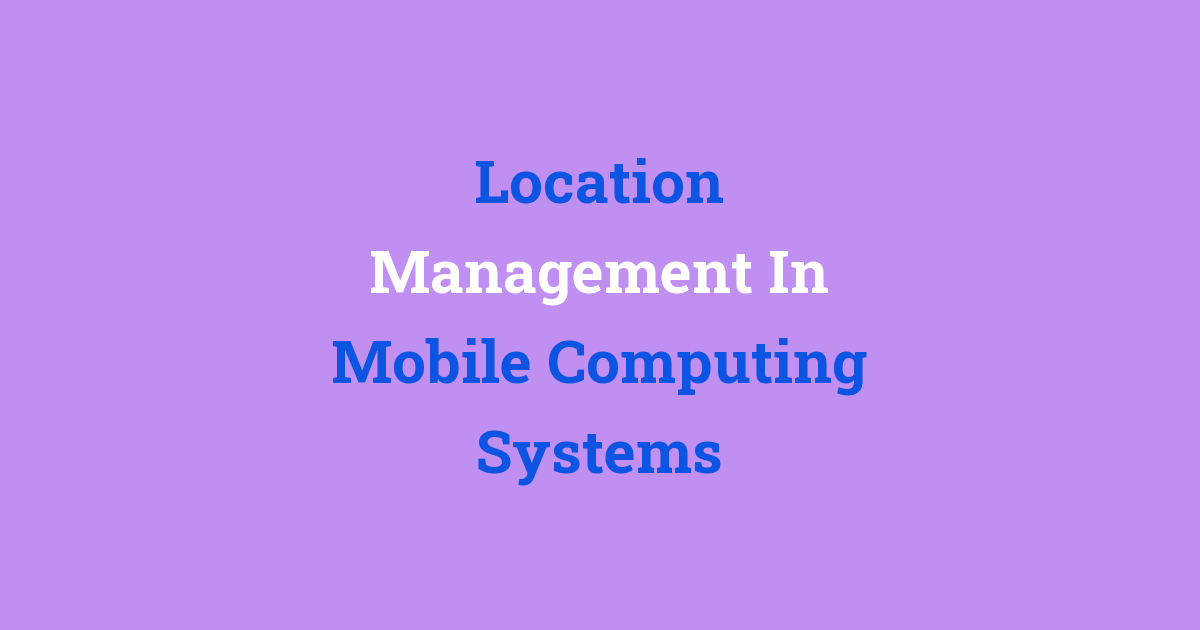Mobile computing systems often require location management for efficient functioning.
Location Management in Mobile Computing Systems
Introduction
Mobile computing systems have become an essential part of our daily lives, enabling us to access information and communicate on the go. One of the key components of mobile computing is location management, which allows devices to track their current position and interact with the surrounding environment. In this project, we will explore the importance of location management in mobile computing systems and propose a new system to improve the efficiency and accuracy of location tracking.
Problem Statement
One of the main challenges in current location management systems is the accuracy of location tracking. GPS technology has made significant advancements in recent years, but it still has limitations in indoor environments or areas with poor satellite signals. This can lead to inaccuracies in location tracking, which can affect the performance of mobile applications that rely on location data. In addition, existing systems may not be able to handle large numbers of devices simultaneously, leading to congestion in the network and slower response times.
Existing System
In the existing location management systems, mobile devices typically rely on GPS signals to determine their location. While GPS technology is highly accurate outdoors, it may not work well indoors or in urban environments with tall buildings that block satellite signals. As a result, mobile applications that require precise location data may experience delays or errors in location tracking. In addition, the current systems may not be able to handle the large volume of location requests from multiple devices, leading to network congestion and reduced performance.
Disadvantages
Some of the disadvantages of the existing location management systems include:
– Inaccurate location tracking in indoor or urban environments
– Congestion in the network due to large numbers of devices
– Slow response times for location requests
– Limited scalability for handling increasing numbers of devices
– High power consumption for continuous GPS tracking
Proposed System
To address the limitations of the existing systems, we propose a new location management system that combines GPS technology with alternative positioning methods such as Wi-Fi or Bluetooth. By using multiple sources of location data, our system aims to improve the accuracy and reliability of location tracking, especially in indoor environments where GPS signals may be weak or unavailable. In addition, our system will employ a distributed architecture to distribute location requests across multiple servers, reducing network congestion and improving response times.
Advantages
Some of the advantages of our proposed location management system include:
– Improved accuracy and reliability of location tracking
– Enhanced performance in indoor or urban environments
– Reduced network congestion and faster response times
– Scalability for handling large numbers of devices
– Lower power consumption for location tracking
Features
Our proposed location management system will include the following features:
– Multi-source location data: Integration of GPS, Wi-Fi, and Bluetooth for accurate positioning
– Distributed architecture: Distribution of location requests across multiple servers for load balancing
– Real-time location updates: Continuous tracking of device location for up-to-date information
– Location-based services: Integration with mobile applications for location-specific services
– Energy-efficient tracking: Optimized power consumption for prolonged battery life
Conclusion
In conclusion, location management is a critical component of mobile computing systems that impacts the performance and usability of applications. By addressing the limitations of existing systems and proposing a new approach to location tracking, we aim to improve the accuracy, reliability, and efficiency of location management in mobile devices. Our system’s integration of multiple positioning methods and distributed architecture will enhance the overall user experience and enable new opportunities for location-based services. With further research and development, we believe that our proposed system will make significant contributions to the field of mobile computing and shape the future of location management technologies.

